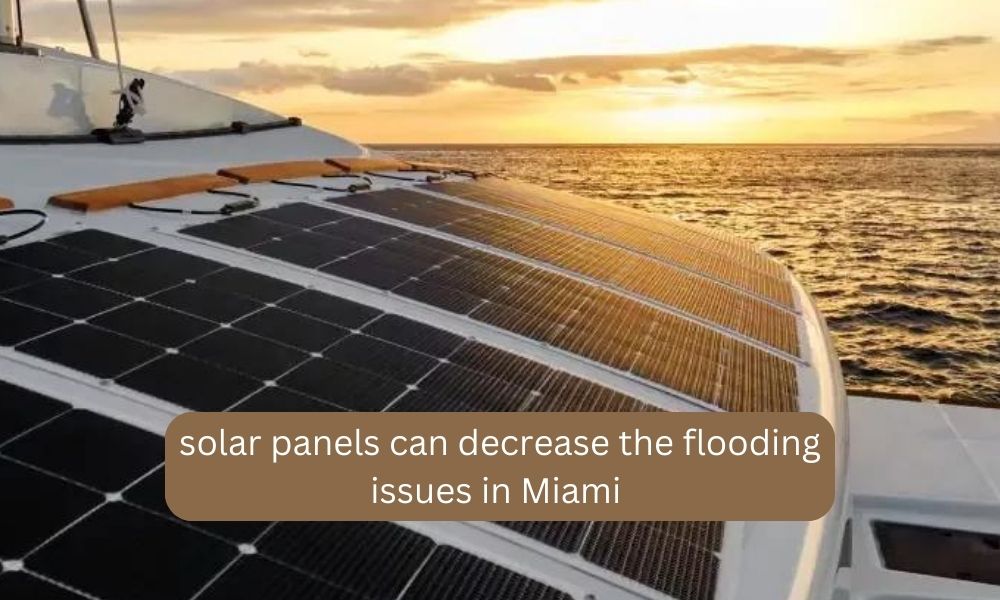Can Solar Panels Decrease the Flooding Issues in Miami Yes these solar panels can decrease the flooding issues in Miami because solar panels can absorb sunlight energy and in this way, less water evaporates. When water evaporation becomes less then rainfall will be less.
“In its search for dry streets, Miami, a city famous for its water problems, is looking to solar panels as a surprising hero. Creative solutions are required to lessen the effects of floods as the city struggles with issues including rising sea levels, severe rains, and deteriorating infrastructure.
The potential of solar panels, which are frequently commended for their beneficial environmental advantages, to lessen flooding in Miami is finally being acknowledged. Solar panels, which capture solar energy, can lessen flooding events in several ways.
- Reducing stormwater runoff through green infrastructure integration
- Powering water pumps and flood-control systems
- Providing energy for water treatment plants
- Supporting flood-resilient construction and design
It has become essential to look for choices as Miami experiences increasingly severe and frequent flooding disasters. Miami may lessen its need for traditional flood-control techniques and give its citizens a more robust, environmentally friendly tomorrow by utilizing solar energy.”
Solar panels can help decrease flooding issues in Miami in several ways
There are a lot of Solar panels that can help decrease flooding issues in Miami in several ways and here we will explore them one by one
Reducing Stormwater Runoff:
Green facilities such as rain gardens and green roofs, may be used with solar panels to lessen the discharge of stormwater and ease the burden on drainage infrastructure.
Powering Water Pumps:
Water pumps and flood control systems may be supplied by solar panels, maintaining their operation during droughts and severe weather.
Energy for Water Treatment:
Treatment facilities for water may be supplied by solar energy, which enables them to function effectively and effectively during floods.
Flood-Resilient Construction:
Through its ability to lower the temperature of the surface and stormwater runoff, solar panels might help minimize the phenomenon of urban heat islands.
Decreasing Urban Heat Island Effect:
Through its ability to lower the temperature of the surface and stormwater runoff, solar panels might help eliminate the phenomenon known as urban heat islands.
Enhancing Flood Monitoring:
To improve the monitoring of flooding and early warning systems and enable more efficient flood control, powered by solar energy sensors can be used.
FAQs
Q: How can solar panels help with flooding in Miami?
A: Solar panels can reduce stormwater runoff, power water pumps and flood-control systems, and enhance flood monitoring.
Q: Can solar panels prevent flooding in Miami?
A: No, solar panels alone cannot prevent flooding, but they can contribute to a comprehensive approach to mitigate flooding.
Q: How do solar panels reduce stormwater runoff?
A: Solar panels can be integrated with green infrastructure like green roofs and rain gardens to absorb rainfall and reduce runoff.
Q: Can solar panels power water pumps during power outages?
A: Yes, solar panels can power water pumps and flood-control systems during power outages and extreme weather events.
Q: How do solar panels enhance flood monitoring?
A: Solar-powered sensors can provide real-time data for effective flood management and enable early warnings for flooding events.
Q: Are solar panels a replacement for traditional flood-control measures?
A: No, solar panels complement traditional measures like sea walls and pumps to create a more resilient flood-management system.
Q: Can solar panels help with flood-resilient construction and design?
A: Yes, solar panels can support flood-resilient construction and design by powering systems that help buildings withstand flooding.
Q: How much can solar panels reduce flooding in Miami?
A: The impact of solar panels on flooding in Miami will vary depending on implementation and integration with other measures.
